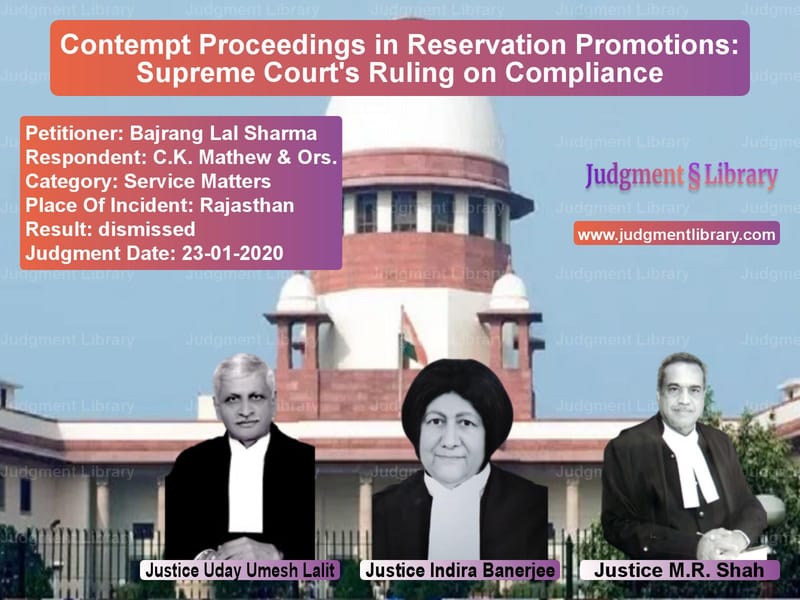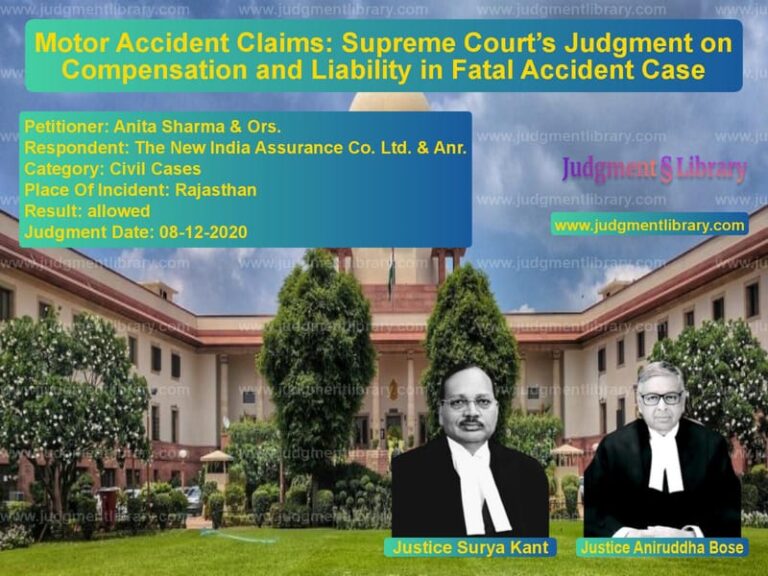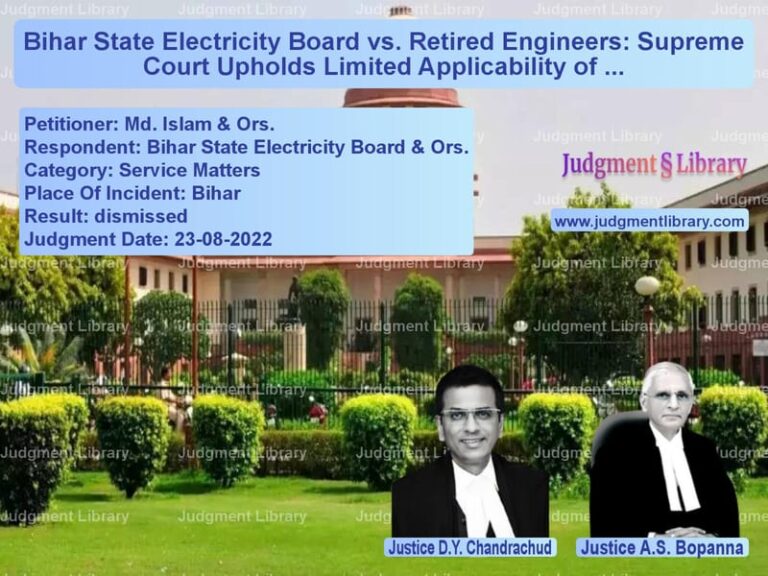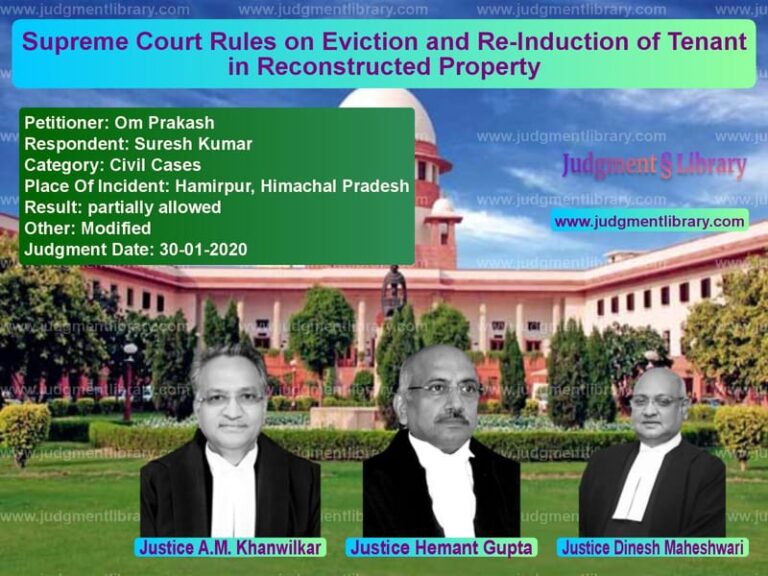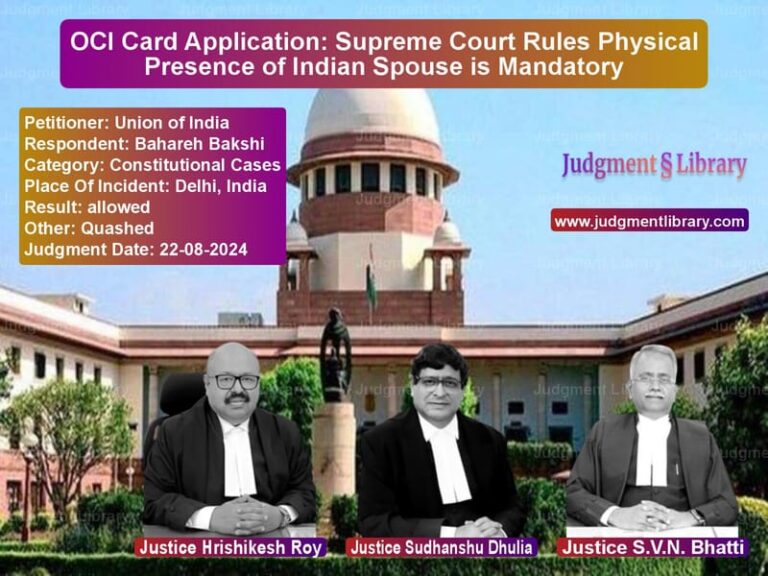Contempt Proceedings in Reservation Promotions: Supreme Court’s Ruling on Compliance
The case of Bajrang Lal Sharma vs. C.K. Mathew & Ors. revolves around a contempt petition filed in the Supreme Court, alleging non-compliance with its earlier rulings regarding reservation in promotions for Scheduled Caste (SC) and Scheduled Tribe (ST) employees in Rajasthan. The Court examined whether the Rajasthan Government had willfully violated its orders concerning the collection of quantifiable data for reservation in promotions.
Background of the Case
The petitioner, Bajrang Lal Sharma, a Rajasthan Administrative Officer, had initially filed a writ petition challenging the state government’s notification that provided consequential seniority to SC/ST employees in promotions. The petitioner sought adherence to the ‘catch-up rule,’ which allows general category employees to regain their seniority once they are promoted after SC/ST employees who had been promoted earlier under reservation policies.
The Rajasthan High Court had earlier quashed the notification on February 5, 2010, which was later upheld by the Supreme Court in Suraj Bhan Meena vs. State of Rajasthan. The Supreme Court had ruled that reservations in promotions must comply with the principles laid down in M. Nagaraj vs. Union of India, which mandated collecting quantifiable data on backwardness and inadequate representation of SC/ST employees.
Arguments by the Petitioner
The petitioner argued that the Rajasthan Government had failed to comply with the Court’s directions and had instead issued a new notification on September 11, 2011, attempting to restore consequential seniority for SC/ST employees. He contended:
“The state government has deliberately disobeyed the Supreme Court’s orders by issuing a notification that bypasses the requirement to collect quantifiable data on backwardness and inadequate representation.”
The petitioner further argued that promotions based on the 2011 notification were made without considering the legal principles set in the M. Nagaraj case, which required evidence of inadequate representation before granting reservation in promotions.
Arguments by the Respondents
The Rajasthan Government defended its actions by stating that it had formed the Bhatnagar Committee to collect the necessary quantifiable data. The state argued that the notification issued on September 11, 2011, was based on the recommendations of this committee.
The state contended:
“The government has acted in compliance with the Supreme Court’s directive by setting up a committee to examine the adequacy of representation of SC/ST employees in government services.”
The respondents further argued that since the matter was still pending in the Rajasthan High Court in multiple writ petitions, the contempt proceedings were unwarranted.
Supreme Court’s Observations
The Supreme Court examined whether the Rajasthan Government had willfully violated its orders. The Court noted that the government had indeed taken steps to comply by forming the Bhatnagar Committee, which submitted its report on August 19, 2011.
Justice Uday Umesh Lalit stated:
“The issuance of the notification dated 11.09.2011 was in exercise of powers vested in the concerned authorities. If the approach and the exercise are otherwise incorrect or wrong, the same can be tested and considered while dealing with the substantive challenge, but such issuance cannot be said to be contumacious to invite any action in contempt jurisdiction.”
The Court found that while there may have been delays and inefficiencies in implementing the Suraj Bhan Meena ruling, the Rajasthan Government had taken concrete steps to collect quantifiable data as required under M. Nagaraj. The Court ruled that there was no deliberate defiance of its orders.
Final Judgment
The Supreme Court dismissed the contempt petition, concluding:
- The state government had made efforts to comply by forming the Bhatnagar Committee and issuing the 2011 notification.
- The notification’s validity should be determined through substantive legal challenges in the Rajasthan High Court, not through contempt proceedings.
- The Court requested the Rajasthan High Court to expedite hearings on pending writ petitions challenging the notification.
Implications of the Judgment
This ruling reinforces the principle that contempt proceedings should not be used to settle legal disputes regarding policy decisions. Instead, such disputes should be addressed through substantive legal challenges in the appropriate courts.
The judgment clarifies:
- Reservation in promotions must adhere to the guidelines set in M. Nagaraj, including the collection of quantifiable data.
- Governments must demonstrate the need for reservation based on empirical evidence rather than issuing blanket notifications.
- Judicial review of administrative actions should be pursued through writ petitions rather than contempt proceedings.
Conclusion
The Supreme Court’s dismissal of the contempt petition highlights the necessity of following due process in challenging government policies. While the state government faced scrutiny for delays in implementation, the Court recognized that it had taken steps towards compliance. This ruling underscores the importance of legal scrutiny in ensuring that reservation policies align with constitutional mandates.
Petitioner Name: Bajrang Lal Sharma.Respondent Name: C.K. Mathew & Ors..Judgment By: Justice Uday Umesh Lalit, Justice Indira Banerjee, Justice M.R. Shah.Place Of Incident: Rajasthan.Judgment Date: 23-01-2020.
Don’t miss out on the full details! Download the complete judgment in PDF format below and gain valuable insights instantly!
Download Judgment: Bajrang Lal Sharma vs C.K. Mathew & Ors. Supreme Court of India Judgment Dated 23-01-2020.pdf
Direct Downlaod Judgment: Direct downlaod this Judgment
See all petitions in Employment Disputes
See all petitions in Promotion Cases
See all petitions in Disciplinary Proceedings
See all petitions in Public Sector Employees
See all petitions in Judgment by Uday Umesh Lalit
See all petitions in Judgment by Indira Banerjee
See all petitions in Judgment by Mukeshkumar Rasikbhai Shah
See all petitions in dismissed
See all petitions in supreme court of India judgments January 2020
See all petitions in 2020 judgments
See all posts in Service Matters Category
See all allowed petitions in Service Matters Category
See all Dismissed petitions in Service Matters Category
See all partially allowed petitions in Service Matters Category

